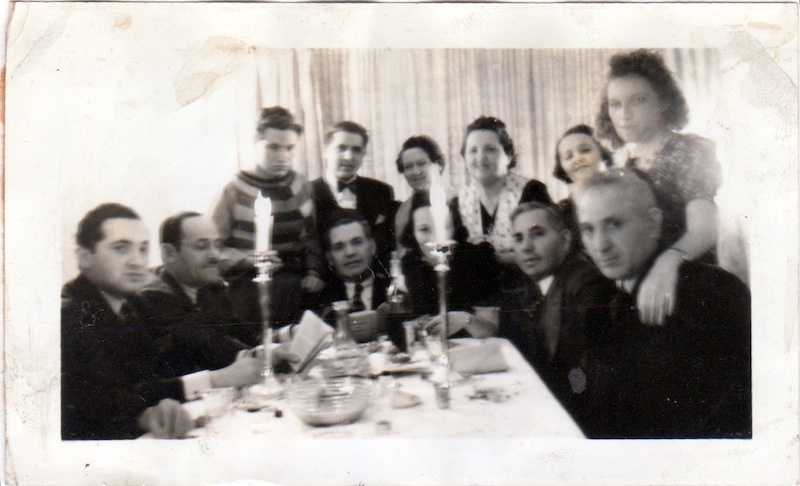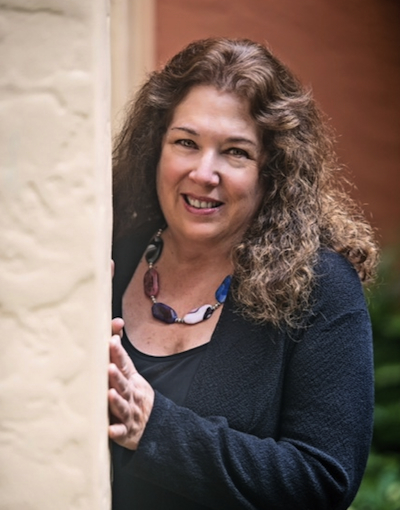Airbrushed Memories [1]
November 21, 2016Flash Nonfiction by Marlene Olin
A Family Gallery from an Unlikely Source

If you grew up Jewish in the 1960s, chances are your grandmother fit a certain stereotype. My bubbe Jenny kept her teeth in a glass, wore a whalebone corset, and mangled the English language. Come here and Comb your hair had no distinction. She read the Forward every morning and chanted the Shema every night. In her prime, I was told, everyone sat by her knee and clamored for her advice. But I only knew the old lady version. The woman who lived with my family in Miami four months a year. The woman who shuffled down the hallway struggling to get to the bathroom on time. I was in eleventh grade when she died.
Her loss lingered. We cooked her recipes—mandle breit, rugelach, stuffed cabbage—but they never came out the same. Though our sentences still had a Yoda-like inflection (A little brisket…would be nice. A sip of Cherry Heering…not for me), most of the Yiddish words she used were soon forgotten.
A few months after she died, I met my future husband. Three years later, I married him. Michael’s grandmother was also Jewish but two decades younger than mine. While Jenny was old country, everything about Michael's grandmother screamed American. She drove a red Volkswagen Beetle, played golf three days a week, feasted on garlic crabs. And she didn't hesitate to share an opinion. She'd comment on your clothes, your attitude, your life. We had circled my grandmother like moths to light. People saw Mildred and ran the other way.
Get a haircut! she'd bark. You're wearing that!
I knew she had good intentions. Mildred was the first to arrive at my children's birthday parties and the last to leave. She'd open her pocketbook whenever anyone needed cash. And the memory of my own grandmother was still very much alive. I superimposed Jenny's face on Mildred's every remark and gesture.
But change is a runaway train. By the 1980s, both of Mildred's sons had divorced their wives. Gerry, my father-in-law, pierced an ear and moved in with a masseuse. Peter, her younger son, filled his home with lava lamps and floor cushions, incense and candles. Mildred may have left the shtetl, but the shtetl never left her. She refused to accept her new world.
The first time we saw the pictures, we laughed. Mildred was recuperating from cataract surgery. Usually, she drove to our home. Instead, Michael and I went to her apartment. We grabbed hard candies from the dish she always kept stocked on her coffee table. Fingered the books on her bookshelves. Made small talk. Then, glancing at her china cabinet, we did a double take. Sitting in a silver frame was a picture of the Pope.
"Grandma," said Michael, "you have a photo of the Pope!"
She was bringing out platters from the kitchen. Cheese. Crackers. Fruit. "That's not the Pope," said Mildred. "That's my father, your great-grandfather Moisha, alav ha-sholom."
On closer inspection, it wasn't a photo. It was simply a black-and-white picture cut out from a magazine. Michael had been named for his great-grandfather, who’d died years before he was born.
"Grandma," said my husband, "I'm pretty sure that's John Paul II. Your father didn't wear a round collar. Your father never wore the papal ring."
By now, Michael had turned as green as Mildred's floral couch. The clock ticked. The air conditioning hummed. There's nothing as terrifying as having front-row seats while watching a loved one crack up.
Mildred walked up to the picture and poked the glass with her finger. "Did you know I don't have one single photo of my father? There's a resemblance, a true resemblance. And this man's smiling and handsome, don't you think?"
In the months to come, new pictures were added to Mildred's walls. The debonair man in the insurance ad looked like her son Gerry only if Gerry were beardless and dressed in a natty suit. The Hallmark cards with frolicking families were clean-cut and divorce-free. The strangers on her walls looked similar to her relatives, just happier and sanitized.
At first, the gallery was just a hobby, and we all indulged her whim. But as the years went by, she convinced herself that the people on the walls were really her family. She'd stare at them for hours, recall anecdotes, tell stories. Who knew what was real and what was not? Her mind had also grown cloudy. By then, her memories may have been airbrushed, too.
Eventually, her body failed and she couldn't live on her own. When we moved her stuff to the nursing home, we made sure to bring her pictures. We visited her every week. But soon Mildred started looking at us in the same blank way she looked at the doctors and nurses.
We scrambled for recognition. We'd bring her favorite foods and sing her favorite songs. But only when we brought a magazine would we be rewarded with a smile. Ta da! we'd say, flourishing our purchase like a bouquet of flowers. And together we'd skim the glossy pages, each one a surprise, each one laden with promise.
Art Information
- Family Photo [4] © Sandy Malnekoff; Creative Commons license.
 Marlene Olin's short stories have been published or are forthcoming in journals such as the Massachusetts Review, Water-Stone Review, Upstreet Magazine, Steam Ticket, American Literary Review, and Poetica. She is the winner of the 2015 Rick DeMarinis Short Fiction Award and a Best of the Net nominee. Her twitter profile is @writestuffmiami [5].
Marlene Olin's short stories have been published or are forthcoming in journals such as the Massachusetts Review, Water-Stone Review, Upstreet Magazine, Steam Ticket, American Literary Review, and Poetica. She is the winner of the 2015 Rick DeMarinis Short Fiction Award and a Best of the Net nominee. Her twitter profile is @writestuffmiami [5].